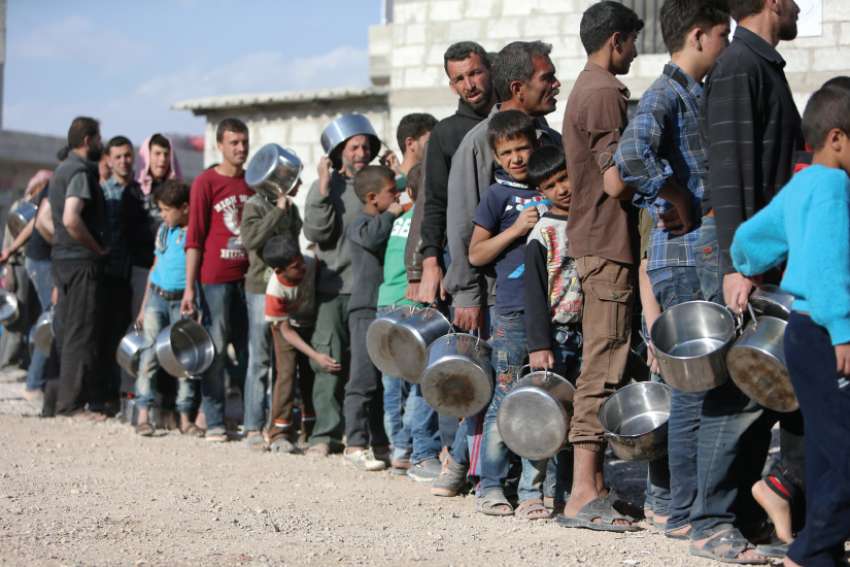“They all told us the same thing,” said Carl Hétu, national director of the Catholic Near East Welfare Association (CNEWA) Canada who made a pastoral visit to Lebanon April 15-19 with Vancouver Archbishop J. Michael Miller to encourage partners who are working with refugees. “The region needs peace. They don’t need more bombs and the refugee crisis cannot be sustained any more in Lebanon.”
The visit came on the heels of a bombing mission by American, British and French forces on April 13 in retaliation for a chemical attack blamed on the Assad regime.
“The burden economically and socially on Lebanon is unbearable,” Hétu said, noting the country of four million people had received 1.5 million refugees from each of Syria and Iraq.
Hétu and Miller met with Lebanese political leaders, the Maronite, Syriac and Melkite Greek Catholic patriarchs, and a number of religious orders helping the refugees.
Hétu said one patriarch told the CNEWA delegation that a report said the western countries had dropped $100 million worth of bombs in the most recent attack. “Think of what that would have meant in aid,” Hétu said he told them.
“People in general just want peace,” Hétu said. “They have had enough with the war. They can’t cope with this anymore. They are stressed out.”
They met with Good Shepherd Sisters who have a dispensary in the poorest neighbourhood of Beirut. “They are totally overwhelmed by the pain of the people, the need of the local Lebanese, Iraqi refugees and Syrian refugees,” he said. “They have new people coming in every day. It’s beyond their capacity.
Mario Bard, director of communications for Aid to the Church in Need Canada, says the recent news they are hearing from Syria is “worrisome.”
Many had felt the war was almost over, with only a few pockets of resistance, he said, but suddenly it has escalated again. “It really scares me,” Bard said.
“The Syrian people don’t want any more of this war,” he said. What had started out with rebels protesting against the government has become an arena for foreign powers.
“The Syrian people have the feeling the war is passing over their head,” Bard said.
Many Syrians suspect the outside powers are interested in Syria’s oil and gas resources, as they are in Iraq’s, he said. However, they don’t know who or what to believe, Bard said.
“The war is like taking a hammer to hit a small bug,” he said, noting other things could have been done to change the regime or improve human rights.
Both Bard and Hétu agree that for peace to come to Syria, regional powers like Saudi Arabia and Iran need to agree, as do the international powers, including Russia, the United States and European countries.
“Until they do, there’s going to be war in Syria,” Hétu said.
Of the Iraqi refugees the CNEWA delegation met, none want to go back to Iraq, he said. They met with 100 parents who all are hoping to go to places like Canada, the U.S. and Europe, he said. “For them, Iraq is finished. It’s over.”
While there have been some Christians returning to Mosul, “it’s dangerous, the destruction level is very high, and they are such a minority there, they don’t know what to expect,” Hétu said.
The story is different though, among Iraqis who had fled to Erbil in the Kurdish region of Iraq. They are returning to villages in the Nineveh Plain in a rebuilding effort supported by Aid to the Church in Need, CNEWA, Development and Peace and other Caritas agencies.
“A lot of the Syrian refugees want to go home, but they don’t know when,” Hétu said. “So many, of course, live in a situation of limbo, of despair.”
Hétu said Christians and Muslims told them to thank the people in Canada and ask them to pray for peace, saying, “We cannot live like this anymore.”
“(The refugees) are resilient,” said Hétu. “They have to live; they have to survive and they are. But how long is that going to last?”
Cries for peace in Syria louder than ever
By Deborah Gyapong, Canadian Catholic NewsOTTAWA – Catholic aid agencies that help Syrian and Iraqi refugees say a recent escalation of conflict in Syria has increased despair and heightened the call for peace from Christian leaders.
Please support The Catholic Register
Unlike many media companies, The Catholic Register has never charged readers for access to the news and information on our website. We want to keep our award-winning journalism as widely available as possible. But we need your help.
For more than 125 years, The Register has been a trusted source of faith-based journalism. By making even a small donation you help ensure our future as an important voice in the Catholic Church. If you support the mission of Catholic journalism, please donate today. Thank you.
DONATE

